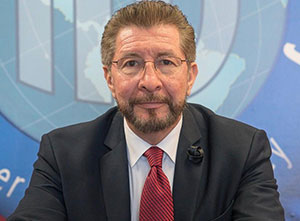Electoral hopes in Bolivia 22 years after the coup that overthrew democracy

By: Carlos Sánchez Berzaín - 12/10/2025
Share:
On October 17, 2003, the Constitutional President of the Republic of Bolivia, Gonzalo Sánchez de Lozada, was overthrown and exiled in an armed uprising perpetrated by a transnational criminal group led by the Cuban and Venezuelan regimes, with local operatives such as Carlos Mesa, Evo Morales, Felipe Quispe, and others, who led the country to the dictatorship/narco-state it is today. Twenty-two years after the loss of democracy, the runoff election on October 19 offers hope that the elected president will decide to end authoritarianism and return to a republic and democracy.
Democracy is not a concept subject to discussion or debate because it is institutionalized in the binding Inter-American Democratic Charter, whose Article 3 establishes its essential elements, which are: "Respect for human rights and fundamental freedoms; access to and exercise of power subject to the rule of law; the holding of periodic, free, and fair elections based on universal and secret suffrage as an expression of the sovereignty of the people; a pluralistic system of political parties and organizations; and the separation and independence of public powers."
In Bolivia, none of the essential elements of democracy exist, because there are political prisoners and exiles deprived of their civil rights, the rule of law has ended falsifications to supplant the Constitution of the Republic, the concentration of power is expressed through the manipulation of justice and the legislature as means of repression and exercise of state terrorism, there is impunity for the public and notorious crimes of members of the regime, there is an extensive and proven system of fraud in the electoral register and in the electoral operation, universal suffrage has been supplanted, there is no free political organization, and more.
The overthrow of President Sánchez de Lozada on October 17, 2003, marked the rupture of democracy in Bolivia, which had been restored 21 years earlier on October 10, 1982. Twenty-two years after the 2003 coup, the runoff election on October 19, 2025, signals the hope of restoring democracy if the president-elect breaks away from the regime's continuity and opts for change, restoring the Republic to the 1994 Political Constitution.
The Bolivian people's current opportunity for a return to democracy is provided by the conflict between dictator-in-chief Evo Morales and his rebel puppet, incumbent dictator Luis Arce Catacora, who rendered the system of fraud ineffective in favor of one of their candidates. In the second round of elections, the two candidates have turned their campaigns into a dark competition to determine who is most closely linked to and most obedient to the dictatorship.
Despite the significant ties and dependencies of both Rodrigo Paz and Jorge Quiroga to the dictatorial regime, local operators, and their transnational bosses, the truth is that the candidate elected president of the Plurinational State of Bolivia has only two options: continuity or a change of system with the restoration of the Republic and Democracy. If he opts for continuity, he could follow the path of President Jeanine Añez (still a prisoner of the dictatorship), and if he chooses change, he must become President of the Republic of Bolivia under the terms of the 1994 Constitution, which has been superseded by force and violence but remains in full force and effect.
In my study "The future of Bolivia depends on constitutional restitution to remove organized crime from power" (Infobae August 26, 2025) I summarize the grounds that prove that "the declaration of validity of the Political Constitution of the Republic of Bolivia of 1994 is an obligation of the new President of Bolivia at the first moment of his mandate. It is based on article 31 of the 1994 Constitution, which imposes: "THE ACTS OF THOSE WHO USURP FUNCTIONS THAT ARE THEIR COMPETENCE, AS WELL AS THE ACTS OF THOSE WHO EXERCISE JURISDICTION OR POWER THAT DOES NOT EMANATE FROM THE LAW, ARE VOID."
The president elected on October 19th has only two options: to be the fourth-ranking official of the dictatorial system known as the "Plurinational State of Bolivia"—that is, the new operator of the transnational organized crime system led by Cuba and Venezuela under their pseudo-constitution, the fruit of crimes, forgery, and massacres, within a system of national subservience, interventionism with loss of sovereignty, guaranteed impunity, and cover-up of corruption, maintaining the narco-state, and more; or to be the president of the Republic of Bolivia and embark on the difficult path of restoring the essential elements of democracy in the country.
In the option of continuity, we have the experience of the interim government of Ms. Jeanine Añez, a sad one for Bolivians and for her. In the option of change with the restoration of the Republic and Democracy, we have the example of President Lenin Moreno, who made Ecuador the only country capable of emerging from the dictatorial system of 21st-century socialism.
*Lawyer and Political Scientist. Director of the Interamerican Institute for Democracy
«The opinions published herein are the sole responsibility of its author».